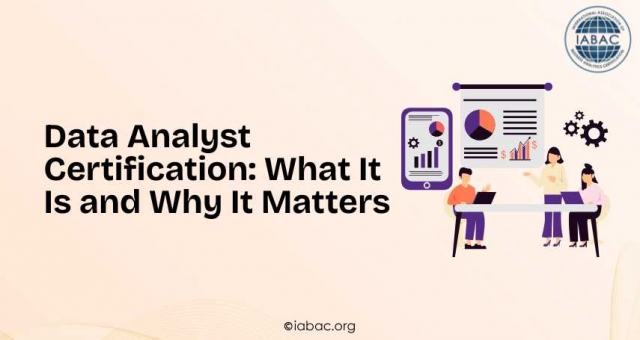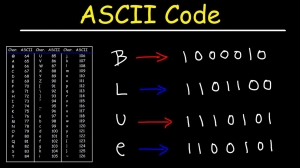Almost every decision made in the modern world is based on data, from personal app recommendations to business strategies. Data analysts are therefore in great demand. However, how can one develop their skills as a data analyst? Getting certified as a data analyst is one way. We'll explain what a data analyst certification is, why it matters, and how it can further your career in this blog.
What Is a Data Analyst?
Before diving into certification, it is important to understand the role of a data analyst.
A data analyst is a professional who collects, processes, and interprets data to help businesses make informed decisions. They use tools like Excel, SQL, Python, and data visualization software to find trends and patterns in large datasets.
In simpler terms, think of a data analyst as someone who translates numbers into stories that businesses can understand. For example, a data analyst can help a retail company understand which products are selling well, or which marketing campaigns are most effective.
What Is a Data Analyst Certification?
The official acknowledgement that you possess the skills and know-how required to carry out the tasks of a data analyst is a data analyst certification.
Professional associations, academic institutions, or online learning environments typically offer these certificates. They frequently involve instruction and assessments that measure your familiarity with data analysis principles, instruments, and methods.
To put it briefly, a certification is evidence that you are capable of managing data analysis jobs in real life.
Why Data Analyst Certification Matters
You might wonder, “Do I really need a certification if I can learn from online tutorials?” The answer is: certifications offer several unique benefits. Let's break them down.
- Builds Credibility
A certification shows employers that you have a verified skill set. It acts as a stamp of approval, signaling that you have met industry standards.
Without certification, you might know the tools, but employers may hesitate to hire someone without formal recognition of their skills.
- Enhances Job Opportunities
Certified data analysts often have an edge in the job market. Many companies specifically look for candidates with certification because it reduces their risk in hiring.
In addition, some roles, especially in large organizations, may require certification as a minimum qualification.
- Increases Earning Potential
Certification can lead to higher salaries. According to industry reports, certified data analysts typically earn more than non-certified professionals in similar roles.
Employers are willing to pay extra for individuals who have demonstrated verified skills that can directly impact business outcomes.
- Validates Knowledge and Skills
A certification doesn't just look good on your resume. It also ensures that you actually understand core data analysis concepts, such as:
- Data cleaning and preprocessing
- Data visualization
- Statistical analysis
- SQL and database management
- Using tools like Excel, Python, R, or Tableau
This validation helps you perform better at work and gives you confidence in your abilities.
- Opens Doors to Advanced Roles
Starting as a data analyst can eventually lead to more advanced roles such as data scientist, business analyst, or data engineer. Certification is often the first step in showing that you have the foundational knowledge required for growth.
Types of Certifications
Depending on your skill level and professional objectives, there are various kinds of data analyst certifications available. The most common kinds are as follows:
- Beginner-Level Certifications
These certifications are suitable for people who are new to data analysis. They cover basic concepts and tools like Excel, SQL, and basic statistics.
- Intermediate-Level Certifications
These certifications go deeper into data analysis techniques, data visualization, and intermediate-level tools such as Python or R.
- Advanced-Level Certifications
Advanced certifications focus on complex analysis, machine learning, big data tools, and predictive modeling. They are suitable for professionals looking to specialize in analytics or move into leadership roles.
- Tool-Specific Certifications
Some certifications focus on specific tools like Tableau, Power BI, Excel, or SQL. These are useful if you want to demonstrate expertise in a particular platform.
How to Choose the Right Certification
Choosing the right certification depends on several factors:
- Career Goals: Are you aiming to become a junior analyst, or do you want to specialize in advanced analytics?
- Skills Level: Are you a beginner, intermediate, or advanced professional?
- Industry Recognition: Choose certifications that are well-recognized by employers.
- Cost and Time: Some certifications are expensive and time-consuming, while others are more flexible.
Taking these things into account will help you choose a certification that best suits your professional goals.
Steps to Prepare for a Data Analyst Certification
Preparing for a certification is easier if you follow a structured approach. Here's a simple roadmap:
- Learn the Basics
Start with core concepts such as statistics, data cleaning, and basic analysis techniques. You can use free resources, online courses, or books.
- Master the Tools
Gain hands-on experience with tools like Excel, SQL, Python, or Tableau. Practice real-world datasets to strengthen your skills.
- Take Practice Tests
Many certification programs provide practice exams. These tests help you understand the format of the exam and identify areas that need improvement.
- Join a Community
Online forums, LinkedIn groups, and study groups can provide support and motivation. Networking with others preparing for the same certification can help you learn faster.
- Schedule and Take the Exam
Once you feel ready, schedule your exam. Stay calm, manage your time well during the test, and focus on applying what you've learned.
Common Tools and Skills Tested in Certification
Although many certifications can highlight different tools and skills, the following are some typical ones:
- Excel: Data cleaning, formulas, pivot tables
- SQL: Querying databases, joins, aggregations
- Python/R: Data manipulation, visualization, basic statistics
- Tableau/Power BI: Creating dashboards and visualizations
- Statistics: Mean, median, standard deviation, correlation
- Problem Solving: Analyzing business scenarios and providing actionable insights
Gaining proficiency in these areas will help you succeed on the certification test and become a capable data analyst in your job.
The Future of Data Analysts
The demand for data analysts is only expected to grow. Businesses are collecting more data than ever, and they need skilled professionals to make sense of it.
By earning a certification, you are positioning yourself to take advantage of new opportunities in data analytics, AI, and business intelligence.
Certified data analysts will continue to be in high demand, and staying certified ensures your skills remain relevant in a rapidly changing field.
A certification as a data analyst is more than simply a document; it's a doorway to career advancement, credibility, and prospects. Certification enhances your market value and certifies your abilities, regardless of your career stage.
The IABAC Data Analyst Certification is an excellent choice for individuals seeking an industry-recognized validation of their skills to launch or further their career.






